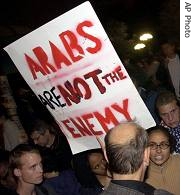2006年VOA标准英语-US Authorities Stress Cooperation With Religiou(在线收听)
By Richard Green
Washington
17 September 2006
 A woman carrying a sign supporting Arabs argues with a man at New York's Union Square (File photo - Sept. 15, 2001) |
||
---
At a recent forum in Washington, U.S. law enforcement officials and leaders of the nation's Muslim, Arab and South Asian communities gathered to discuss their attempts to improve relations since the September 11, 2001, terrorist attacks in the United States.
Laila al-Qatami, communications director for the American-Arab Anti-Discrimination Committee, remembered the initial response from the public when terrorists flew hijacked planes into the World Trade Center towers in New York City and the Pentagon outside Washington.
"I happened to be watching the news like probably many of you, and I know after the first plane hit, I answered the phone in our office, and, immediately, people were saying, 'We know you did this, and we're going to get you for it,'" she said.
Authorities say there was a huge jump in the number of hate crimes committed against members of the nation's Muslim, Arab and South Asian communities in the aftermath of the attack, as well as numerous civil rights violations. Al-Qatami says her community deplores terrorism, but says combating terrorism should not be at the expense of America's most important values.
"ADC has been very unequivocal in its condemnation of violence against civilians. We've also been very unequivocal in doing our part to help secure the nation," added Al-Qatami. "But we've also been unequivocal in our belief that any of those efforts to secure our country should not come at the expense of our civil rights."
Wan Kim, the assistant attorney general for the Civil Rights Division in the U.S. Justice Department, says he and community leaders like al-Qatami try to resolve disagreements on issues that affect members of these communities on a day-to-day basis.
"We talk through specific issues, like, persons, who have problems with the no-fly lists, persons who are having problems with visa applications, persons who feel like they may be investigated unfairly," noted Wan Kim.
Daniel Sutherland, the civil rights and civil liberties officer in the Department of Homeland Security, says these discussions have led law enforcement officials to enact policies aimed at addressing these concerns.
"For example, we put out a new policy across the government on what is racial profiling, what does it mean," said Sutherland. "We've done training and tutorials for our enforcement officers about what does racial profiling mean, and how do you really effectively target people that you're concerned about, without descending into ethnic or racial profiling."
Manjit Singh, the acting chair of the Sikh American Legal Defense and Education Fund, says both sides have formed a give-and-take relationship that addresses the issue of how authorities can be vigilant about looking out for potential terrorists, while still protecting civil rights.
"It's an ongoing dialogue. It's an ongoing process. But it has helped tremendously, where we better understand some of the positions that the different agencies take," he said. "And, the officials understand why the community has this concern, why we are so hyper-sensitive to some of these issues. And, at times, we are accommodating, and at times they are accommodating. Other times, we are not. That's it, it's a respectful disagreement."
Ahmed Younis, the national director of the Muslim American Public Affairs Council, says authorities must also earn the trust of the ethnic communities.
"The more trust that exists, the better of an ability we have to engage in what is basically community policing," commented Younis. "The less trust that exists, the less of an ability we will have to convince our communities that government is here for the best interest of the community."
Brett Hovington, the head of the FBI's Community Relations Unit, says it is important that individuals in the Muslim, Arab and South Asian communities be involved in this effort.
"I would call upon everyone to figure out how we can get that information down to the grassroots level, to the individuals that need to hear that they can be engaged with their government," noted Hovington. "They can still be who they are. They can still practice the religion they want to practice."
Hovington says it is up to everyone to take responsibility in fighting the war on terrorism.